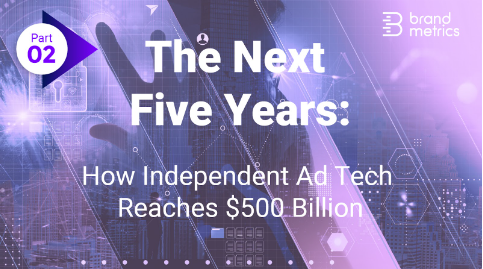By Tom Jenen, Chief Revenue Officer, Brand Metrics
If the publicly-traded independent ad tech sector, currently slightly under $100bn, is to reach a valuation of $500bn in the next five years, good things need to happen. But that doesn’t mean there won’t be disruption. In fact, that’s where we look first for signs of massive growth.
It’s simple: As a result of our need to compete to survive, independent ad tech is much, much more innovative than the big monopoly platforms. The big platforms don’t innovate – they create incremental improvements that grow their market advantage and help them predictably increase revenues.
It’s left to independent ad tech to respond faster to market requirements, regulations and customer needs. So the risks are high, but the rewards are potentially high as well.
Here are the seeds of disruption being sown by several internal and external factors that I think will yield the biggest opportunities.
Data privacy concerns
Consumers and activists, along with regional and factional concerns, drive politicians to clarify and tighten data privacy laws. And yet, consumers are still growing their online behaviour: Data privacy concerns haven’t stopped them in the least. They are, however, trying to make more informed choices: Deloitte’s Digital Consumer Trends Survey 2021 revealed that 74% of UK consumers are concerned about how the companies with which they interact with online use their personal data.
Ad tech has adapted quickly. Don’t get me wrong, we are still acquiring masses of data, but not necessarily personal data. Our goal actually isn’t to compromise people, it’s always been to drive better performance for advertisers. To do that, we are ensuring we are compliant with regulations and that our policies are clear to both consumers and regulators, while listening to what advertisers want now. But we’re now exploring the potential of new and different data sets like never before, using those insights to generate competitive advantages, while including nearly all relevant stakeholders, both inside and outside our businesses.
So, everyone has picked a strategy for dealing with data privacy. And I have yet to see a start-up in the last three years that didn’t consider its data privacy position before building its tech. That has de-risked a large section of ad tech businesses and bodes extremely well for the future.
The ad tech winners in all these include the monopoly platforms, obviously. But there are also significant opportunities here for ID solutions, clean rooms, data clearing houses and consent solutions, and measurement solutions that don’t rely on personal data`.
Macroeconomy
It’s not just data privacy that is creating disruption and opportunity. War in Europe’s east is a problem, but dare I say, less than in other industries? Russia’s GDP is actually small relative to their geopolitical importance; somewhere between Italy and Spain, actually – like Italy minus Norway. As a result, Russia (and Ukraine) were never big markets for independent ad tech.
China is a different story – disruption there can create serious havoc for buyers and sellers. But given that Chinese markets have not been easy to enter for independent ad tech, that disruption is mostly priced in. In fact, taking some of the Chinese funding – and Chinese-funded competitors – out of the equation may actually make independent ad tech perversely more valuable to Western buyers, as Chinese players aren’t in our target group.
Valuations might actually go up. If it weren’t for…
The recession/currency markets/inflation.
With disruption comes opportunity (you see a theme emerging here) and that includes a recession. Typically there are decreases in advertising when a recession hits. That makes sense, as it’s easier to fire a commercial than it is the people who made it.
But it’s often the large brand spend, much of it spent on linear TV, that suffers first. There’s some brand spend online, but that doesn’t account for the majority of digital budgets. Digital has traditionally lived on performance budgets, in which clicks are the currency and short-term sales revenue the goal.
Marketers are hungry for sales in a recession, and as long as digital can deliver revenue attribution, as an industry it will win, as it did in 2008, with Independent ad tech among the big winners.
Currency markets are fluctuating, but given that the US is doing fine – and most independent ad tech has scaled, or will soon scale, into the US, it might actually raise some fortunes while stalling others.
Inflation is the big problem, and its roiling of equity markets. This will obviously need to calm down before anybody of size or substance will go public and the valuations of current players will go up again.
The ad tech winners: Those that potentially stand to profit from a recession include programmatic advertising, video and CTV players.
Moves by the global monopoly platforms
The threatened, as yet unseen, death of the cookie has had the critical effect of forcing all parts of the ecosystem to choose a lane. While it has been a stressful process for a lot of players, it has also been a huge benefit to the overall fitness of the ad tech market.
Most players have now figured out how they plan to deliver value post-cookie and this has led to a mass “de-risking” of the industry. Apple’s IDFA changes radically changed the fortunes of Meta and Snapchat, but independent ad tech has shifted more easily.
Companies who make money from advertising with game platforms have begun to chase brand budgets rather than in-app install revenue, which is drying up, and marketers are learning too.
Microsoft has bought Xandr, and with its deal to support Netflix in its own advertising ambitions, becomes the heir apparent to anyone with a non-Google strategy. But there are others in the market who have strong tech in direct competition with Google – think Equativ (formerly Smart Adserver) – which would be an easy choice to go public at a $1B+ valuation over the next year.
Meanwhile, established DSPs like Adform and Mediamath are innovating again. And there are even smaller competitors who have created new innovations that, if bought, could accelerate a larger company’s strategy.
Apple’s moves in privacy and its plan to create its own DSP may send a chill down the spine of the other platforms, who have been feeding on Apple’s data for years, but I’m hopeful that two things will come out of these developments for Independent ad tech:
- Apple will value advertising revenue, and thus value the interconnections that make it more money. At the very least they will have to have some independent verification, but they also will understand how the rest of the ecosystem can bring value.
- The rest of us will learn how to work with Apple as well – in particular how to generate value with the highest level of privacy and data protection. This isn’t easy. But the benefits for the rest of us are long-term and sustainable.
The ad tech winners: Overall, the winners from all this monopoly-level disruption are contextual ad platforms, cookieless solutions, in-game specialists, “replacement tech”, measurement and verification vendors – companies such as Permutive, LoopMe, Azerion, Adverty, Adform, Equativ and Mediamath, and I’d be lying if I said I didn’t believe in the prospects of my own company, brand lift measurement specialist Brand Metrics.
And there are other winners too, including those working hard in new sectors – of which more next time.









